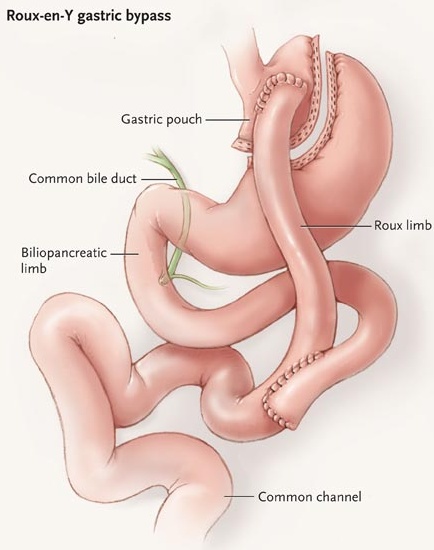
What is a Roux-en-Y Gastric Bypass?
In Roux-en-Y gastric bypass (GBP) surgery, most of your stomach is separated away from a small “pouch.” This pouch is about one ounce after surgery — the size of a golf ball — and is where your food will go after you swallow. The vast majority of gastric bypass procedures are done laparoscopically.
After gastric bypass, the connection from your pouch to your intestines will be a fixed opening, similar to a small funnel. The amount of food you'll be able to eat will be very small. Along with your stomach, the top part of your intestines will also be bypassed, meaning that food will not pass through that area. This causes some malabsorption of vitamins and minerals.
Weight loss mostly occurs because portion sizes are limited. Also, levels of ghrelin — also called the “hunger” hormone — decrease, so your appetite is initially reduced.
Possible Advantages of Gastric Bypass Surgery
- Reduced hunger
- Restricted portions
- Durable weight loss
- Improvement or complete resolution of more than 40 weight-related diseases
Possible Disadvantages of Gastric Bypass Surgery
- Ulcers from smoking or NSAID use
- Stricture or narrowing of opening to intestines
- High sugar foods may cause dumping syndrome
- High fat foods may cause steatorrhea (a type of diarrhea)
- Reactive hypoglycemia or low blood sugar between meals
- Bypassing the intestines may lead to vitamin or mineral deficiency
Recovery and Diet After Roux-en-Y Gastric Bypass Surgery
After gastric bypass, you'll need to make longterm changes to your diet and lifestyle.
Shortly after surgery, you'll begin reintroducing foods into your diet in phases. You'll start consuming a clear liquid diet within 24 hours of your surgery, then advance to a full liquid diet, a soft food diet, and your regular diet in the weeks ahead.
You will have follow-up visits with your bariatric surgery team 10 days after your surgery, then again after six weeks, three months, six months, and annually thereafter. You'll also work with a registered dietitian and have the opportunity to attend support groups with other bariatric surgery alumni to help ensure you don't fall back into old habits.
You will also have to avoid certain foods, such as simple sugars, including honey, white sugar, or syrups, to avoid dumping syndrome.